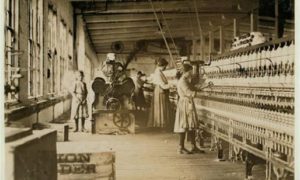There was a full house for Steve Irwin’s talk about the Lancashire Cotton Famine and the American Civil War and it was great to see so many people returning to their normal activities and pastimes after the worries of the last eighteen months.
Stephen has worked as the Education Officer for Blackburn Museum for the past 17 years and he entertained and enlightened us with his depth of knowledge of the 1860-62 cotton famine and how it affected the people involved in the cotton trade in East Lancashire. At that time in the UK four million people out of a population of 20 million were reliant on the cotton trade to some degree for their livelihood. The cotton was imported through Liverpool then spun and woven in Lancashire mill towns before being exported all over the world and 1859-60 were boom years for the trade. At this time 2650 cotton mills were at work in Lancs and Cheshire. Though the hours were long the pay was good and people flocked to the mill towns from rural areas, with whole families being involved in production.

Attribution: Journal of Victorian Culture’ web site. Courtesy of Stephen Irwin.
However 75% of the cotton we relied on came from America and the Civil War there caused chaos here in supplies of raw cotton.The Lancashire people had strong views about the war and although most were against slavery, they also hated the Confederate plantation owners for putting an embargo on cotton, so tended to support the Union.
The Confederates were hoping to force the British government to come into the war on their side by hitting their textile industry, but their plan failed and without our support the Union were the victors. The war led to the bankruptcy of many of the small mills in Lancashire. Local mill owners, mostly nonconformist, were on the side of their workers and helped to support them during the famine by establishing soup kitchens and food distribution centres. With no social safety net if you didn’t work, you couldn’t eat and in 1862 33% of Blackburn people were in need of this support Despite the harsh conditions no one actually starved in Blackburn and hopefully not around here either.

Soup Kitchen ticket. Courtesy of Blackburn Library, ‘Cotton Town’ local history web site
This stimulating look back at our local heritage was followed by a lively Q & A time and refreshments.
And did you know?
The old mill buildings you see today are not from the Cotton Famine era, they were built when industrialisation of the industry grew.
Before the Civil war 440, ooo people were employed in the mills and as many again in the industries supplying the mills
Output was worth £11.5 million worth around £1.3 billion in todays money. Cotton workers were more affluent than we imagined.